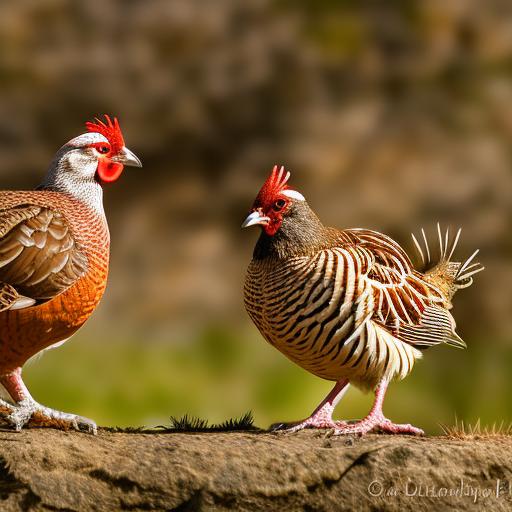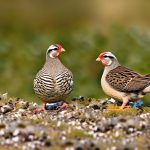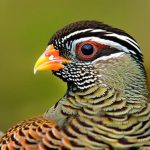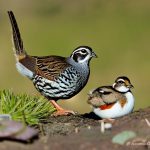Keeping turkeys, chickens, and quail together can be a rewarding and efficient way to manage a small farm or homestead. Each of these birds has its own unique characteristics and benefits, and when kept together, they can complement each other in various ways. Turkeys are known for their large size and delicious meat, while chickens are valued for their eggs and meat. Quail, on the other hand, are smaller birds that are also raised for their eggs and meat. By keeping these birds together, you can maximize the use of your space and resources while enjoying a diverse range of poultry products.
When considering keeping turkeys, chickens, and quail together, it’s important to understand the compatibility of these birds, the right environment for them, their feeding and nutrition needs, health considerations, and how to manage their social dynamics. By taking these factors into account and implementing the right strategies, you can successfully keep these birds together and enjoy the benefits they bring to your farm or homestead.
Key Takeaways
- Keeping turkeys, chickens, and quail together can be a rewarding and efficient way to raise poultry on a small farm or homestead.
- Understanding the compatibility of turkeys, chickens, and quail is essential to ensure they can coexist peacefully and thrive together.
- Creating the right environment for turkeys, chickens, and quail involves providing adequate space, shelter, and protection from predators.
- Feeding and nutrition for turkeys, chickens, and quail should be carefully balanced to meet the specific dietary needs of each species.
- Health considerations for keeping turkeys, chickens, and quail together include disease prevention, parasite control, and regular veterinary care.
Understanding the Compatibility of Turkeys, Chickens, and Quail
Before deciding to keep turkeys, chickens, and quail together, it’s essential to understand the compatibility of these birds. While they can coexist in the same environment, there are some considerations to keep in mind. Turkeys are generally larger and more aggressive than chickens and quail, so it’s important to provide enough space for all the birds to avoid overcrowding and potential conflicts. Additionally, turkeys have different nutritional needs compared to chickens and quail, so it’s crucial to ensure that all birds have access to the appropriate feed and supplements.
Chickens and quail are generally more docile and can coexist peacefully with each other and with turkeys as long as there is enough space and resources for everyone. However, it’s important to monitor the interactions between the birds to ensure that there is no bullying or aggression. Providing separate feeding and watering stations can help minimize competition and ensure that all birds have access to the resources they need. By understanding the compatibility of turkeys, chickens, and quail, you can create a harmonious environment for these birds to thrive together.
Creating the Right Environment for Turkeys, Chickens, and Quail
Creating the right environment for turkeys, chickens, and quail is essential for their health and well-being. When keeping these birds together, it’s important to provide a spacious and secure coop or housing area that allows for ample room for movement and roosting. Additionally, providing separate nesting areas for each type of bird can help minimize competition and ensure that all birds have a comfortable space to lay their eggs.
In terms of outdoor space, it’s important to provide a large fenced area that allows the birds to roam freely while also protecting them from predators. Providing natural vegetation, such as bushes and trees, can offer shade and shelter for the birds while also providing opportunities for foraging. It’s also important to provide dust bathing areas for chickens and quail, as this is a natural behavior that helps them maintain healthy feathers and skin.
When creating the right environment for turkeys, chickens, and quail, it’s important to consider their specific needs and behaviors while also ensuring that they have access to clean water, appropriate feed, and protection from extreme weather conditions. By providing a well-designed environment, you can create a comfortable and safe space for these birds to thrive.
Feeding and Nutrition for Turkeys, Chickens, and Quail
Feeding and nutrition are crucial aspects of keeping turkeys, chickens, and quail together. While these birds can share some types of feed, it’s important to provide specific feeds tailored to their individual nutritional needs. Turkeys require a higher protein diet compared to chickens and quail, especially during their growth stages. Providing a turkey-specific feed that is high in protein can help support their growth and overall health.
Chickens and quail have similar nutritional requirements and can often share the same type of feed. However, it’s important to monitor their intake to ensure that all birds are getting enough nutrients without being outcompeted by others. Providing access to grit for all birds is essential for proper digestion, as it helps them break down food in their gizzards.
In addition to commercial feeds, it’s important to provide access to fresh greens, fruits, and vegetables for all birds. This can help supplement their diet with essential vitamins and minerals while also providing enrichment through natural foraging behaviors. Providing access to clean water at all times is also crucial for the health and well-being of turkeys, chickens, and quail. By understanding their specific feeding and nutrition needs, you can ensure that all birds are getting the nutrients they need to thrive.
Health Considerations for Keeping Turkeys, Chickens, and Quail Together
When keeping turkeys, chickens, and quail together, it’s important to be proactive about their health and well-being. Monitoring the birds regularly for signs of illness or injury is crucial for early intervention and treatment. Additionally, providing a clean living environment with good ventilation can help prevent respiratory issues that can affect all three types of birds.
It’s also important to be aware of common diseases and parasites that can affect turkeys, chickens, and quail. Implementing a regular deworming program can help prevent parasite infestations that can negatively impact the health of the birds. Additionally, providing access to dust bathing areas can help birds naturally control external parasites such as mites.
Another important aspect of maintaining the health of turkeys, chickens, and quail is vaccination. Depending on your location and local disease risks, it may be necessary to vaccinate the birds against certain diseases such as Newcastle disease or fowl pox. Consulting with a veterinarian or poultry health expert can help you develop a vaccination program tailored to the specific needs of your birds.
By being proactive about health considerations and implementing good biosecurity practices, you can help prevent disease outbreaks and maintain the overall health of your turkeys, chickens, and quail.
Managing Social Dynamics Among Turkeys, Chickens, and Quail

Managing social dynamics among turkeys, chickens, and quail is an important aspect of keeping these birds together. Turkeys are known for their hierarchical social structure with dominant individuals establishing a pecking order within the flock. It’s important to provide enough space for turkeys to establish their social hierarchy without causing excessive aggression or bullying.
Chickens also have a pecking order within their flock, with dominant individuals asserting their authority over others. When keeping chickens with turkeys and quail, it’s important to monitor their interactions to ensure that there is no excessive aggression or bullying. Providing multiple feeding stations can help minimize competition among birds while also ensuring that all individuals have access to food.
Quail are generally more docile than turkeys and chickens but can still exhibit aggressive behaviors if overcrowded or stressed. Providing enough space for quail to establish their own territories within the flock can help minimize aggression and promote harmonious social dynamics.
By understanding the social dynamics of turkeys, chickens, and quail and providing enough space and resources for all birds, you can help minimize conflicts and create a peaceful coexistence among these different poultry species.
Tips for Successfully Keeping Turkeys, Chickens, and Quail Together
Successfully keeping turkeys, chickens, and quail together requires careful consideration of their compatibility, environment, feeding and nutrition needs, health considerations, and social dynamics. By providing enough space for all birds to establish their territories without excessive competition or aggression, you can create a harmonious living environment for these poultry species.
It’s important to monitor the interactions between turkeys, chickens, and quail regularly to ensure that there is no bullying or aggression. Providing separate feeding stations can help minimize competition while also ensuring that all birds have access to the resources they need.
Maintaining the health of turkeys, chickens, and quail requires proactive measures such as regular monitoring for signs of illness or injury, implementing good biosecurity practices, deworming programs, vaccination when necessary.
By understanding the specific needs of turkeys, chickens, and quail and implementing the right strategies for managing their social dynamics, you can successfully keep these birds together while enjoying the benefits they bring to your farm or homestead.
If you’re considering keeping turkeys, chickens, and quail together, it’s important to understand the dynamics of managing different poultry species in the same space. Poultry Wizard offers a comprehensive guide on turning a shed into a chicken coop, which can provide valuable insights into creating a suitable environment for multiple bird species. Check out their article on turning a shed into a chicken coop to learn more about optimizing your coop for diverse poultry needs.
FAQs
Can you keep turkeys, chickens, and quail together?
Yes, it is possible to keep turkeys, chickens, and quail together in the same coop or living space. However, there are certain considerations and precautions that need to be taken to ensure the well-being of all the birds.
What are the considerations for keeping turkeys, chickens, and quail together?
It is important to consider the size of the living space, the temperament of the birds, and their specific needs for food, water, and shelter. Additionally, it is important to monitor for any signs of aggression or bullying among the different species.
What are the potential challenges of keeping turkeys, chickens, and quail together?
One potential challenge is the risk of disease transmission between the different species. Additionally, there may be competition for resources such as food and water, and certain species may exhibit aggressive behavior towards others.
How can you minimize potential issues when keeping turkeys, chickens, and quail together?
To minimize potential issues, it is important to provide ample space for the birds, separate feeding and watering stations, and monitor the birds for any signs of stress or aggression. It is also important to maintain good hygiene and cleanliness in the living space to reduce the risk of disease transmission.
Are there any specific tips for keeping turkeys, chickens, and quail together?
Some tips for keeping turkeys, chickens, and quail together include providing different levels or areas within the living space for the birds to retreat to, ensuring that each species has access to their specific dietary needs, and observing the birds regularly to ensure they are cohabitating peacefully.
Meet Walter, the feathered-friend fanatic of Florida! Nestled in the sunshine state, Walter struts through life with his feathered companions, clucking his way to happiness. With a coop that’s fancier than a five-star hotel, he’s the Don Juan of the chicken world. When he’s not teaching his hens to do the cha-cha, you’ll find him in a heated debate with his prized rooster, Sir Clucks-a-Lot. Walter’s poultry passion is no yolk; he’s the sunny-side-up guy you never knew you needed in your flock of friends!







